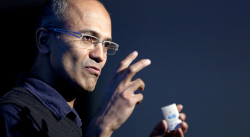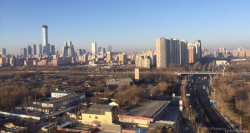 Moore’s Law does many things. It is deflationary, and it accelerates the pace of change. It has given us longer lifespans, with more ease, than any generation before.
Moore’s Law does many things. It is deflationary, and it accelerates the pace of change. It has given us longer lifespans, with more ease, than any generation before.
Moore’s Law was originally a prediction that chip densities could double, every year or two, as far out as Gordon Moore, later co-founder of Intel, could foresee, at least in 1965. But it is much more. Moore’s Law infects every technology, and everything technology touches, accelerating the pace of change in every direction.
For example.
I should be dead by now, or infirm, as my father was at my age. But the discovery of statins and ARBs keep my cholesterol, measured at 373 in 2000, and resulting hypertension under control. (My dad had his first heart attack at age 47.) My dear wife should be crippled, or dying, but advances in treating cancer and implanting artificial joints mean she still walks ahead of me.
This is Moore’s Law in action. Call it Moore’s Law of Health. We live longer because of the technology created by Moore’s Law, and for those who can afford it, an active life to age 100 is within reach.
But there is no Moore’s Law of Software. Software only improves as new tools are created and implemented.
There is no Moore’s Law of Education. You learn only as fast as you learn.
There is also no Moore’s Law of Politics. If there is one, it acts in reverse, against change. We don’t change our political beliefs in reaction to technology. Our assumptions remain those we started with. Very few people change political sides.

That’s why Trump.
Trump, and other Republicans, can make American knees jerk to the past because those knees still live. We vote more regularly as we age, we get more politically involved as we age, but if our politics are rooted in the past they drag the nation backward.

If you’re 50 or older, you probably don’t understand the economics of technology, or what it wants from society to keep growth going. Studying this has been my life.
In technology, the gating factor of economic growth is human capital. Not just labor, but trained, ambitious, focused minds. Computers require human ingenuity to do anything, they require the passion of invention and entrepreneurism. The 21st century requires more STEM graduates, and it requires people in other fields who understand where change comes from and will support that with their own individual genius.

I saw the impact of this again on a recent trip to visit my son. He’s in Minneapolis, one of the Twin Cities. But thanks to the University of Minnesota, and biological science programs like the one where he’s studying, Minneapolis is growing fast while St. Paul, wedded to government and bureaucracy, has begun to stagnate.

Trumpism rejects human capital as the key to economic growth. Those tech entrepreneurs who support Trump are “bros” who think only an elect they select should be allowed to think. They create things like Uber with a few “genius boys” at the top and a ton of drudges below. That’s grossly inefficient. It’s also cynical because those same genius boys know the drivers will soon be replaced by software.
Most technologists know better. It’s why I have always had confidence that technology would triumph in the end. The old ways will die. Those who understand the new needs of business will win. Economics will drive the train.

Moore’s Law of Politics remains a powerful force, politically immovable. While I found hope in Minneapolis, the rest of my drive defied it. Farming is manufacturing, and those farmers who remain on the land are Trump’s base. Oil and mining are resource industries, and while technology can substitute among raw materials, if given its head, the people doing the work continue to resist this change.
Our country, and our planet, continue careening toward disaster, poised between the pull of Moore’s Law and the pushback of Moore’s Law of Politics. The balance is finely drawn.
It may be that the American system, as it has existed for 230 years, is inadequate to the task. A more parliamentary system may be needed, where a majority can work its will, even if policies are quickly reversed when a contrary majority rises. In that case the Republicans’ junking of norms, of ending the filibuster and pushing through judges wedded to the past, will prove salutary, assuming a new majority is equally willing to junk those norms, to change the system and even the Constitution.

Liberals, and technologists, must not shirk from this task. It is time for a radical re-think of how government works, of how liberty can be expanded but also ordered, as the pace of change made possible by Moore’s Law continues its inevitable acceleration.
If we can’t do it, China will.










